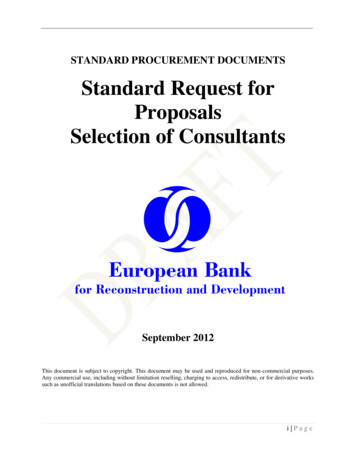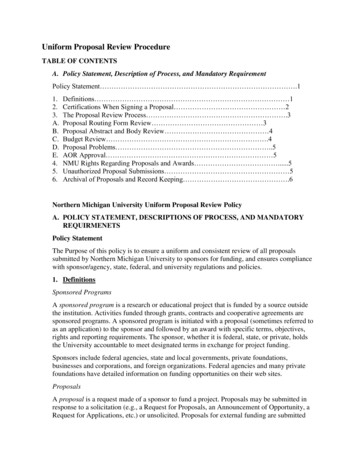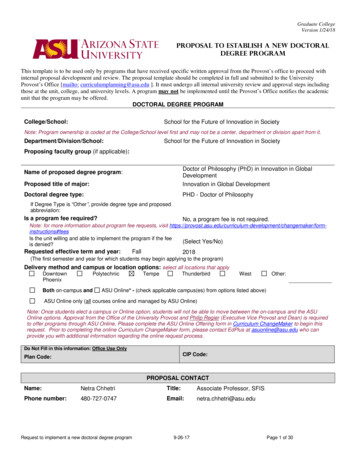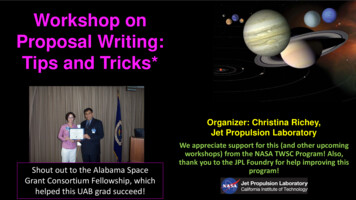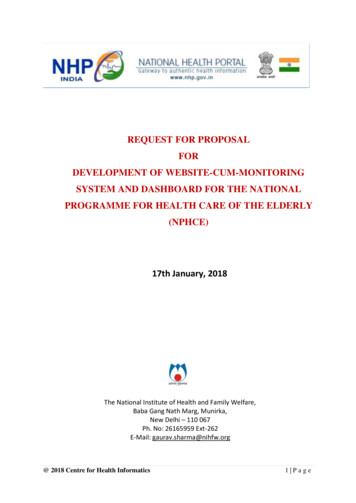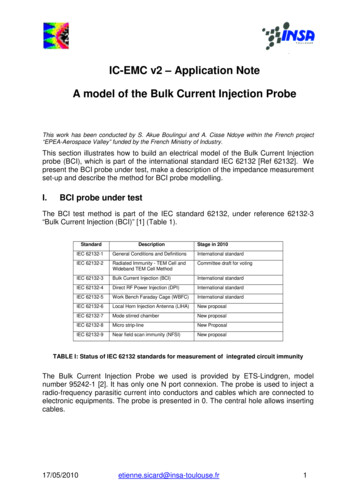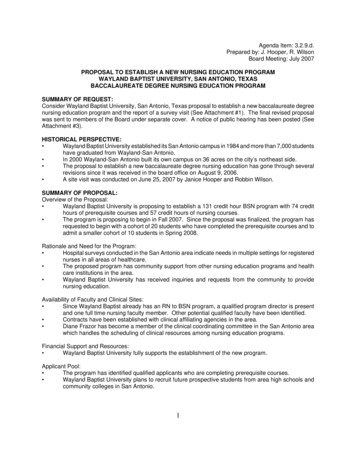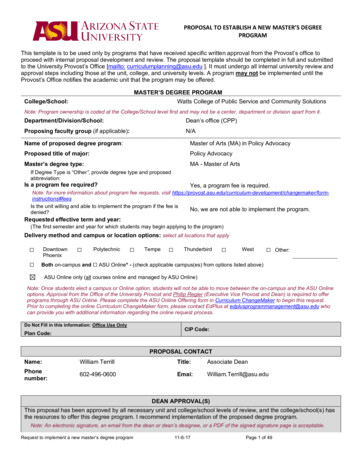
Transcription
PROPOSAL TO ESTABLISH A NEW MASTER’S DEGREEPROGRAMThis template is to be used only by programs that have received specific written approval from the Provost’s office toproceed with internal proposal development and review. The proposal template should be completed in full and submittedto the University Provost’s Office [mailto: curriculumplanning@asu.edu ]. It must undergo all internal university review andapproval steps including those at the unit, college, and university levels. A program may not be implemented until theProvost’s Office notifies the academic unit that the program may be offered.MASTER’S DEGREE PROGRAMCollege/School:Watts College of Public Service and Community SolutionsNote: Program ownership is coded at the College/School level first and may not be a center, department or division apart from it.Department/Division/School:Dean’s office (CPP)Proposing faculty group (if applicable):N/AName of proposed degree program:Master of Arts (MA) in Policy AdvocacyProposed title of major:Policy AdvocacyMaster’s degree type:MA - Master of ArtsIf Degree Type is “Other”, provide degree type and proposedabbreviation:Is a program fee required?Yes, a program fee is required.Note: for more information about program fee requests, visit ngemaker/forminstructions#feesIs the unit willing and able to implement the program if the fee isNo, we are not able to implement the program.denied?Requested effective term and year:(The first semester and year for which students may begin applying to the program)Delivery method and campus or location options: select all locations that apply DowntownPhoenix Polytechnic Tempe Thunderbird West Other:Both on-campus and ASU Online* - (check applicable campus(es) from options listed above)ASU Online only (all courses online and managed by ASU Online)Note: Once students elect a campus or Online option, students will not be able to move between the on-campus and the ASU Onlineoptions. Approval from the Office of the University Provost and Philip Regier (Executive Vice Provost and Dean) is required to offerprograms through ASU Online. Please complete the ASU Online Offering form in Curriculum ChangeMaker to begin this request.Prior to completing the online Curriculum ChangeMaker form, please contact EdPlus at edplusprogrammanagement@asu.edu whocan provide you with additional information regarding the online request process.Do Not Fill in this information: Office Use OnlyPlan Code:CIP Code:PROPOSAL CONTACTName:William TerrillTitle:Associate su.eduDEAN APPROVAL(S)This proposal has been approved by all necessary unit and college/school levels of review, and the college/school(s) hasthe resources to offer this degree program. I recommend implementation of the proposed degree program.Note: An electronic signature, an email from the dean or dean’s designee, or a PDF of the signed signature page is acceptable.Request to implement a new master’s degree program11-6-17Page 1 of 49
PROPOSAL TO ESTABLISH A NEW MASTER’S DEGREEPROGRAMCollege/School/Division Deanname:William TerrillSignature:7/7/2020Date:Please note: Proposals for new degrees also require the review and recommendation of approval from the UniversityGraduate Council, Curriculum and Academic Programs Committee (CAPC), the Academic Senate (2 readings), and theOffice of the Provost before they can be put into operation.The final approval notification will come from the Office of the Provost.1. PURPOSE AND NATURE OF PROGRAMA. Provide a brief program description:The MA in Policy Advocacy program will provide training and skills needed for successful careers within policyadvocacy. Students will understand both the role of public policy and how it relates to policy advocacy, but alsohow to effectively communicate public policy to appropriate stakeholders (e.g., how to break down nuancedacademic studies and translate into demonstrative action). In addition, students will learn analytical andmethodological techniques to evaluate public policy strategies and determine their effectiveness in solvingpolicy issues from an empirical standpoint.Expertise and knowledge are required to navigate increasingly complex legal, communication, political, andpolicy landscapes, and effectively create societal change. This has prompted various groups to useprofessionals to champion concerns, and influence opinion, laws, and policies ranging from local tointernational. Ethical, skilled policy advocacy professionals are in demand to represent all sections of societyincluding nonprofit, private, and public sectors.The program is particularly relevant for students who intend to work with nonprofit organizations, elected andappointed officials, community-based organizations, think tanks, foundations, enterprises, political and civicleaders, and other social organizations that attempt to shape policies through advocacy efforts. Typical careerpaths for graduates of this program include lobbyists, governmental and inter-governmental relations officers,policy analysts, legislative analysts, communication directors, and legislative assistants. The goal for a policyadvocacy graduate in future employment is to raise public and legislative awareness of social issues and topropose solutions for these issues in an attempt to influence action. It is expected that graduates of this programfind employment in many facets of the public and private sectors.B. Will concentrations be established under this degree program? YesNo(Please provide additional concentration information in the curricular structure section – number 7.)2. PROGRAM NEEDExplain why the university should offer this program (include data and discussion of the target audience andmarket).This program directly addresses elements of the ASU Charter by creating opportunities to increase theprofessionalism of individuals that can represent economic, social, cultural, and health concerns of local, state,national and other communities. Governmental and regulatory environments have become increasingly complexand it is essential for organizations that influence policy to have considerable expertise and knowledge in order tonavigate these legal, communication, political and policy landscapes. This complex environment has promptednonprofit, public, and private organizations to increasingly call upon professionals to champion their concerns, andinfluence opinion, legal precedent from all levels ranging from local to international policy. Policy advocacyencompasses a wide range of activities that influence decision makers. This includes traditional activities such aslitigation, lobbying, and public education. It can also include collaboration, communication, relationship building,Request to implement a new master’s degree program11-6-17Page 2 of 49
PROPOSAL TO ESTABLISH A NEW MASTER’S DEGREEPROGRAMforming networks, and leadership development. To be engaged in policy advocacy, organizations and individualsneed to know not only how to identify problems, but how to isolate causes, analyze evidence, work with research,develop effective policy options and evaluate the cost-benefit of these options. Policy advocacy often seeks toinfluence policy at the decision-making level, such as public officials, public servants, elected officials andlegislators. Policy advocacy must also involve citizen participation, so that local communities have the opportunity toactively participate in making the policy change happen.The target audience is professionals from policy, legal, communication and other backgrounds with an interest inpolicy advocacy and other working professionals seeking a career change or looking to enhance their skill set.Graduates from this program may find employment in all levels of the public sector (federal, state, and localgovernments), as well as with nonprofit and private organizations. This degree will allow graduates to either begin oradvance their careers in a wide range of fields, including: lobbying, public-private partnerships, child advocacy,community issues and development, health advocacy, law, education, social justice education, government, humanrights, disability rights, environmental justice, human services, criminal justice, health care, business, nonprofitorganizations and more. Very few universities in the nation offer any specific degrees that develop the high-levelskills and techniques that are crucial to create change at the individual, community, and public policy levels.Programs such as the certificate in Public Policy Advocacy at USC’s Sol Price School of Public Policy and the MPAspecialization in Advocacy and Political Action at NYU’s Wagner School of Public Service are not full degreeprograms and are intended to complement an existing degree. Many policy advocacy programs are also specific tojust one policy area such as health or education policy, like Johns Hopkins Public Health Advocacy certificateprogram and Georgetown University’s Advocacy and Policy concentration within its MA in EducationalTransformational program. This proposed program will encompass the whole arena of policy advocacy and will beapplicable and transferrable across multiple sectors. The few programs that lead to a full graduate degree in policyadvocacy that exist, such as the Master of Advocacy and Political Leadership program at Metropolitan StateUniversity, are much smaller in both scope and scale than the proposed program at ASU. The window ofopportunity is open for ASU and Watts College to leverage its standing and become the national leader in the fieldof policy advocacy.According to the Bureau of Labor Statistics' Occupational Outlook Handbook, employment of community and socialservice occupations is projected to grow 14 percent from 2016 to 2026, faster than the average for all occupations,adding about 371,900 jobs. In addition, O*NET Online lists Social and Community Service Managers as a brightoutlook occupation with a growth rate of 18% by 2026. Policy advocacy careers encompass multiple careeropportunities across various sectors, including public and private sectors. However, with a focus on public policy, itis expected that the majority of careers involving policy advocacy will center on those that impact community andsocial policy issues or those that intersect those issues across both public and private sectors.3. IMPACT ON OTHER PROGRAMSAttach any letters of collaboration or support from impacted programs (see checklist sheet). Please submit as aseparate document.See Appendix III.4. PROJECTED ENROLLMENTRequest to implement a new master’s degree program11-6-17Page 3 of 49
PROPOSAL TO ESTABLISH A NEW MASTER’S DEGREEPROGRAMHow many new students do you anticipate enrolling in this program each year for the next five years?Note: The Arizona Board of Regents (ABOR) requires that nine master’s degrees be awarded every three years. Thus, theprojected enrollment numbers must account for this ABOR requirement.5-YEAR PROJECTED ANNUAL ENROLLMENTPlease utilize thefollowing tabularformat1st YearNumber of StudentsMajoring(Headcount)202nd Year3rd Year4th Year5th Year(Yr. 1 continuing new entering)(Yr. 1 & 2 continuing new entering)(Yrs. 1, 2, 3 continuing new entering)(Yrs. 1, 2, 3, 4 continuing new entering)50901101205. ACCREDITATION OR LICENSING REQUIREMENTS (if applicable)Provide the names of the external agencies for accreditation, professional licensing, etc. that guide your curriculumfor this program, if any. Describe any requirements for accreditation or licensing.N/A6. STUDENT LEARNING OUTCOMES AND ASSESMENTAttach a PDF copy of the assessment plan printed from the University Office of Evaluation and EducationalEffectiveness assessment portal demonstrating UOEEE’s approval of your assessment plan for this program. Visitthe assessment portal at https://uoeee.asu.edu/assessment-portal or contact uoeee@asu.edu with any questions.See Appendix II.7. CURRICULAR STRUCTUREA. Curriculum ListingAll courses below are existing ASU courses that have been offered recently. No new courses will need to bedeveloped.Required Core Courses for the DegreePrefix and NumberCourse TitleNew Course?PAF 505Public Policy AnalysisNo3SWG 687Public Policy and AdvocacyNo3Section sub-total:Credit Hours6Policy Restricted Elective Courses(as deemed necessary by supervisory committee)Students choose four courses from the list below for a total of 12 credit hours. Other courses may substitute withapproval from program chair.Prefix and NumberCourse TitleNew Course?GTD 511Development Policy and PracticesNo3HCI 550Health Care Policy and InnovationNo3MGT 565Business Strategy and Public PolicyNo3PAF 540Adv Policy AnalysisNo3PAF 544Urban PolicyNo3PAF 546Environmental Policy and ManagementNo3Request to implement a new master’s degree program11-6-17Page 4 of 49Credit Hours
PROPOSAL TO ESTABLISH A NEW MASTER’S DEGREEPROGRAMPAF 548Women/Politics/Public PolicyNo3PAF 591Topic: Ending Homelessness through Public PolicyNo3Section sub-total:12Advocacy, Communication and Change Restricted Elective Courses(as deemed necessary by supervisory committee)Students choose three courses from the list below for a total of 9 credit hours. Other courses may substitute withapproval from program chair.Prefix and NumberCourse TitleNew Course?Credit HoursCRD 572Community and Social InnovationsNo3MCO 561Defining the Digital AudienceNo3NLM 562Social EntrepreneurshipNo3NLM 598Topic: Nonprofit Marketing and CommunicationNo3PAF 529Organization Change and DevelopmentNo3PAF 531Community Conflict ResolutionNo3PIT 502Co-Designing the FutureNo3PIT 504Public Engagement StrategiesNo3Section sub-total:9Culminating Experience(s)E.g. – Capstone course, portfolio, written comprehensive exam, applied project,thesis (must be 6 credit hours with oral defense)Credit HoursCPP 593 Applied Project3Section sub-total:30Total required credit hours1.2.3.3List all required core courses and total credit hours for the core (required courses other than internships, thesis, capstone course, etc.).Omnibus numbered courses cannot be used as core courses.Permanent numbers must be requested by submitting a course proposal to Curriculum ChangeMaker for approval.B. Will concentrations be established under this degree program? YesNo8. COURSESA. Course Prefix(es): Provide the following information for the proposed graduate program.i.Will a new course prefix(es) be required for this degree program?Yes NoIf yes, complete the Course Prefixes / Subjects Form for each new prefix and submit it as part of thisproposal submission. Form is located under the courses tab.B. New Courses Required for Proposed Degree Program: Provide course prefix, number, title, credit hours andbrief description for any new courses required for this degree program.NoneRequest to implement a new master’s degree program11-6-17Page 5 of 49
PROPOSAL TO ESTABLISH A NEW MASTER’S DEGREEPROGRAM9. FACULTY, STAFF, AND RESOURCE REQUIREMENTSA. Facultyi.Current Faculty – Complete the table below for all current faculty members involved in the program. Iflisting faculty from an academic unit outside of the one proposing the degree, please provide a supportstatement from that unit.NameRankWilliam TerrillAssociateDean andProfessorProfessorDanielSchugurenskyDavid BecerraSpiro MaroulisCraig TalmageElizabethCorleySandy PriceChris Herbstii.HighestDegreePhDPhDArea ofSpecialization/ExpertisePublic policyEstimated Level ofInvolvementHighCommunity development,participatory democracy, civicengagementSocial policyHighPublic policy, collectivebehaviorCommunity satisfaction,community engagementLowAssociateDirector archAssociateProfessorPhDPhDPublic ity and socialinnovation, volunteermanagementPublic policyPhDPhDMediumLowLowNew Faculty - Describe the new faculty hiring needed during the next three years to sustain the program.List the anticipated hiring schedule and financial sources for supporting the addition of these facultymembers.No new faculty in the short-term are anticipated for this program as it utilizes existing university courses andinstruction. If anticipated enrollment by Year 5 is met, the college may consider hiring at least one additionalfaculty member to teach the core courses.iii.Administration of the program - Explain how the program will be administered for the purposes ofadmissions, advising, course offerings, etc. Discuss the available staff support.Current college resources will be sufficient for administration of this program. The program will beadministered by the program’s graduate chair who, along with the program support and administrative staff,is responsible for the overseeing and implementing all college-level programs in the department. Thegraduate chair is responsible for evaluating all admission applications and any issues relating to thecurriculum. Current administrative staff include two full-time graduate advisors and a project manager.Current staff will process and maintain applications, advise students, process iPOS, and work as liaisonswith other schools in terms of their course offerings. They will also be the liaisons with both the GraduateCollege and ASU Online.B. Resource requirements needed to launch and sustain the program: Describe any new resources requiredfor this program’s success such as new staff, new facilities, new library resources, new technology resources,etc.Existing university and college resources are sufficient for this program.Request to implement a new master’s degree program11-6-17Page 6 of 49
PROPOSAL TO ESTABLISH A NEW MASTER’S DEGREEPROGRAMRequest to implement a new master’s degree program11-6-17Page 7 of 49
PROPOSAL TO ESTABLISH A NEW MASTER’S DEGREEPROGRAMAPPENDIX IOPERATIONAL INFORMATION FOR GRADUATE PROGRAMS(This information is used to populate the Graduate Programs Search/catalog website.)1. Proposed title of major: Policy Advocacy2. Marketing description (Optional - 50 words maximum. The marketing description should not repeat content found in theprogram description.)This unique graduate program prepares professionals to directly impact change in our world by developing theskills, abilities, and understanding of how our political and legal world operates, how to create and analyze publicpolicy, and how we can be influential and impactful change agents.3. Provide a brief program description (Catalog type (i.e. will appear in Degree Search) – no more than 150 words. Do notinclude any admission or curriculum information)Expertise and knowledge are required to navigate increasingly complex legal, communication, political, and policylandscapes, and effectively create societal change. This has prompted various groups to use professionals tochampion concerns, and influence opinion, laws, and policies ranging from local to international. Ethical, skilledpolicy advocacy professionals are in demand to represent all sections of society including nonprofit, private, andpublic sectors. This applied degree is oriented to those interested in acquiring the necessary skills to becomeeffective agents of policy change and directly addresses elements of ASU Charter by creating opportunities toincrease the professionalism of individuals who can represent these concerns at all levels.4. Delivery/Campus Information Options:ASU Online only5. Campus(es) where program will be offered:ASU Online curriculum consists of courses that have no face-to-face content. iCourses are online courses for students in oncampus programs. iCourses may be included in a program, but may not comprise the entirety of a program. On-campusprograms must have some face-to-face content.Note: Office of the Provost approval is needed for ASU Online delivery option.ASU Online only (all courses online and managed by ASU Online)All other campus or location options (please select all that apply): DowntownPhoenix Both on-campus and ASU Online* - (check applicable campus(es) from options listed above)Polytechnic Tempe West Other:Note: Once students elect a campus or Online option, students will not be able to move between the on-campus and the ASUOnline options. Approval from the Office of the University Provost and Philip Regier (Executive Vice Provost and Dean) isrequired to offer programs through ASU Online. Please complete the ASU Online Offering form in Curriculum ChangeMaker tobegin this request. Prior to completing the online Curriculum ChangeMaker form, please contact EdPlus atasuonline@asu.edu who can provide you with additional information regarding the online request process.6. Admission Requirements:Applicants must fulfill the requirements of both the Graduate College and the Watts College of Public Service andCommunity Solutions.Applicants are eligible to apply to the program if they have earned a bachelor's or master's degree in any field,from a regionally accredited institution.Applicants must have a minimum cumulative GPA of 3.00 (scale is 4.00 "A") in the last 60 hours of their firstbachelor's degree program, or applicants must have a minimum cumulative GPA of 3.00 (scale is 4.00 "A") inan applicable master's degree program.All applicants must submit:Request to implement a new master’s degree program11-6-17Page 8 of 49
PROPOSAL TO ESTABLISH A NEW MASTER’S DEGREEPROGRAM1.2.3.4.5.6.graduate admission application and application feeofficial transcriptstwo letters of recommendationwritten statementprofessional resumeproof of English proficiencyAdditional Application InformationAn applicant whose native language is not English must provide proof of English proficiency regardless of currentresidency.7. Application Review Terms (if applicable session):Indicate the first term and year in which applications will be opened for admission. Applications will be acceptedon a rolling basis after that time.Note: It is the academic unit’s responsibility to display program deadline dates on their website.TermsYearsUniversity Late Fee DeadlineFall (regular)Session B(year): 2021July 1st(year): 2021October 1stSpring (regular)Session B(year): 2022December 1st(year): 2022February 8thSummer (regular) Summer B(year): 2022May 14th(year):May 14thNote: Session B is only available for approved online programs.Program admission deadlines website duate?field asu ap campus value All&field asu ap value 1 18. Curricular Requirements:Curricular Structure Breakdown for the Academic Catalog:(To be completed by the Graduate College)30 credit hours including the applied project course (CPP 593)Required Core (6 credit hours)PAF 505 Public Policy Analysis (3)SWG 687 Public Policy and Advocacy (3)Policy Restricted Electives (12 credit hours)Advocacy, Communication and Change Restricted Electives (9 credit hours)Culminating Experience (3 credit hours)CPP 593 Applied Project (3)Additional Curriculum InformationFor restricted electives, students should see the academic unit for the current list of courses that may fulfillthis requirement. Other courses may be substituted with approval from the program chair.Request to implement a new master’s degree program11-6-17Page 9 of 49
PROPOSAL TO ESTABLISH A NEW MASTER’S DEGREEPROGRAM9. Comprehensive Exams:Master’s Comprehensive Exam (when applicable), please select from the appropriate option.N/A10. Allow 400-level courses:Yes NoNote: No more than 6 credit hours of 400-level coursework may be included on a graduate student plan of study.11. Committee:Required number of thesis committee members (must be at least 3 including chair or co-chairs): N/ARequired number of non-thesis option committee members (must be a minimum of one): 112. Keywords: List all keywords that could be used to search for this program. Keywords should bespecific to the proposed program – limit 10 keywords.Politics, change, communication, public, private, nonprofit, influencer, lobbying13. Area(s) of InterestA. Select one (1) primary area of interest from the list below that applies to this program.Architecture & ConstructionInterdisciplinary StudiesArtsLaw & JusticeBusinessMathematicsCommunication & MediaPsychologyEducation & TeachingSTEMEngineering & TechnologyScienceEntrepreneurshipSocial and Behavioral SciencesHealth & WellnessSustainabilityHumanitiesB. Select one (1) secondary area of interest from the list below that applies to this program.Architecture & ConstructionInterdisciplinary StudiesArtsLaw & JusticeBusinessMathematicsCommunications & MediaPsychologyEducation & TeachingSTEMEngineering & TechnologyScienceEntrepreneurshipSocial and Behavioral SciencesHealth & WellnessSustainabilityHumanities14. Contact and Support Information:Office Location - BuildingCode & Room:UCENT 780Campus TelephoneNumber:602-496-1019Program Email Address:idpadvising@asu.eduProgram Website inary/homeProgram Director (Name):William Terrill(Search ASU map)(may not be an individual’s number)(may not be an individual’s email)(if one is not yet created, use unitwebsite until one can be established)Request to implement a new master’s degree program11-6-17Page 10 of 49
PROPOSAL TO ESTABLISH A NEW MASTER’S DEGREEPROGRAMProgram Director(ASURITE):Program Support Staff(Name):Program Support Staff(ASURITE):Admissions Contact(Name):Admissions Contact(ASURITE):15.wcterrilDezaree Yarbroughdjyarbr1Crystal Ramirezccramir7Application and iPOS Recommendations: List the Faculty and Staff who will input admission/POSrecommendations to Gportal and indicate their approval for Admissions and/or POS:NAMEASURITEADMSNPOSChristopher HiryakhiryakXXStephanie Alveysread1XXDezaree Yarbroughdjyarbr1XXCrystal Ramirezccramir7XXRequest to implement a new master’s degree program11-6-17Page 11 of 49
PROPOSAL TO ESTABLISH A NEW MASTER’S DEGREEPROGRAMAPPENDIX IIASSESSMENT PLANRequest to implement a new master’s degree program11-6-17Page 12 of 49
PROPOSAL TO ESTABLISH A NEW MASTER’S DEGREEPROGRAMRequest to implement a new master’s degree program11-6-17Page 13 of 49
PROPOSAL TO ESTABLISH A NEW MASTER’S DEGREEPROGRAMRequest to implement a new master’s degree program11-6-17Page 14 of 49
PROPOSAL TO ESTABLISH A NEW MASTER’S DEGREEPROGRAMAPPENDIX IIIStatements of Collaboration and ImpactWatts College of Public Service and Community Solutions – Official SubmissionRequest to implement a new master’s degree program11-6-17Page 15 of 49
PROPOSAL TO ESTABLISH A NEW MASTER’S DEGREEPROGRAMSchool of Community Resources and Development, Watts CollegeRequest to implement a new master’s degree program11-6-17Page 16 of 49
PROPOSAL TO ESTABLISH A NEW MASTER’S DEGREEPROGRAMRequest to implement a new master’s degree program11-6-17Page 17 of 49
PROPOSAL TO ESTABLISH A NEW MASTER’S DEGREEPROGRAMRequest to implement a new master’s degree program11-6-17Page 18 of 49
PROPOSAL TO ESTABLISH A NEW MASTER’S DEGREEPROGRAMSchool of Public Affairs, Watts CollegeRequest to implement a new master’s degree program11-6-17Page 19 of 49
PROPOSAL TO ESTABLISH A NEW MASTER’S DEGREEPROGRAMRequest to implement a new master’s degree program11-6-17Page 20 of 49
PROPOSAL TO ESTABLISH A NEW MASTER’S DEGREEPROGRAMSchool of Social Work, Watts CollegeRequest to implement a new master’s degree program11-6-17Page 21 of 49
PROPOSAL TO ESTABLISH A NEW MASTER’S DEGREEPROGRAMRequest to implement a new master’s degree program11-6-17Page 22 of 49
PROPOSAL TO ESTABLISH A NEW MASTER’S DEGREEPROGRAMRequest to implement a new master’s degree program11-6-17Page 23 of 49
PROPOSAL TO ESTABLISH A NEW MASTER’S DEGREEPROGRAMRequest to implement a new master’s degree program11-6-17Page 24 of 49
PROPOSAL TO ESTABLISH A NEW MASTER’S DEGREEPROGRAMEdson College of Nursing and Health InnovationRequest to implement a new master’s degree program11-6-17Page 25 of 49
PROPOSAL TO ESTABLISH A NEW MASTER’S DEGREEPROGRAMKatherine (Kathy) Kenny, DNP, RN, ANP-BC, FAANP, FAANAssociate Dean of Academic AffairsClinical Professor550 N. 3rd Street Phoenix, AZ 85004(P) 602-496-1719(F) andhealth.asu.edu/Request to implement a new master’s degree program11-6-17Page 26 of 49
PROPOSAL TO ESTABLISH A NEW MASTER’S DEGREEPROGRAMRequest to implement a new master’s degree program11-6-17Page 27 of 49
PROPOSAL TO ESTABLISH A NEW MASTER’S DEGREEPROGRAMMary Lou Fulton Teachers CollegeFrom: William Terrill wcterrill@gmail.com Date: Wed, Jun 17, 2020 at 4:52 PMSubject: Re: Request for support/impact statementTo: Carole Basile (Dean) Carole.Basile@asu.edu Thank you!William Terrill, PhDArizona State UniversityAssociate Dean, Watts College of Public Service and Community SolutionsProfessor, School of Criminology & Criminal JusticeCo-Editor, Policing: A Journal of Policy & PracticeOn Wed, Jun 17, 2020 at 4:38 PM Carole Basile (Dean) Carole.Basile@asu.edu wrote:The Mary Lou Fulton Teachers College is happy to support this program. We do not see aconflict and always glad to have one of our courses included as an elective.Thanks,cbCarole G. BasileDean and ProfessorMary Lou Fulton Teachers CollegeArizona State Universitycarole.basile@asu.edu(480) 965-4064Request to implement a new master’s degree program11-6-17Page 28 of 49
PROPOSAL TO ESTABLISH A NEW MASTER’S DEGREEPROGRAMRequest to implement a new master’s degree program11-6-17Page 29 of 49
PROPOSAL TO ESTABLISH A NEW MASTER’S DEGREEPROGRAMCollege of Global FuturesRequest to implement a new master’s degree program11-6-17Page 30 of 49
PROPOSAL TO ESTABLISH A NEW MASTER’S DEGREEPROGRAMSchool for the Future of Innovation in Society, College of Global FuturesRequest to implement a new master’s degree program11-6-17Page 31 of 49
PROPOSAL TO ESTABLISH A NEW MASTER’S DEGREEPROGRAMRequest to implement a new master’s degree program11-6-17Page 32 of 49
PROPOSAL TO ESTABLISH A NEW MASTER’S
programs and are intended to complement an existing degree. Many policy advocacy programs are also specific to just one policy area such as health or education policy, like Johns Hopkins Public Health Advocacy certificate program and Georgetown University's Advocacy and Policy concentration within its MA in Educational Transformational program.
